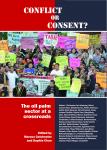
'Conflict or Consent?' Chapter 13: Summary case study on the situation of Golden Veroleum Liberia’s oil palm concession
16 Dec 2013
The Golden Veroleum Liberia (GVL) concession agreement was concluded on 16th August 2010 and provides a lease for 220,000 ha of land to GVL in Liberia's southern counties. Community grievances concerning the loss of land to the company, the destruction of crops and water sources, the lack of respect for communities' rights to free, prior and informed consent (FPIC) in land acquisition and associated allegations of intimidation, arrests and harassment directed at community leaders, led to several complaints.





